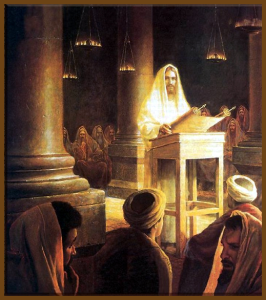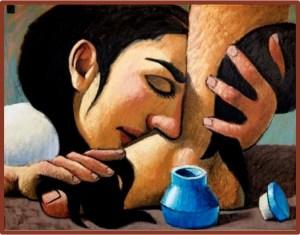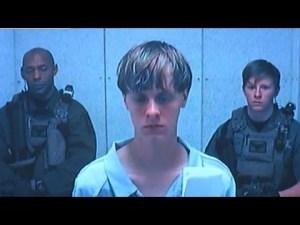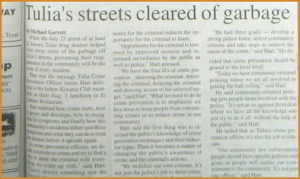
By Alan Bean
This sermon was originally preached at Springcreek Community Church in Garland, Texas.
Fresh from wrestling with the Devil through forty days and forty nights, Jesus shows up in his home church of Nazareth and uses the ancient words of the prophet Isaiah to lay down his manifesto:
The Spirit of the Lord is upon me
because he has anointed me
to preach good news to the poor.
He has sent me to proclaim release to the captives
and recovery of sight to the blind;
to set at liberty those that are oppressed,
to proclaim the Lord’s jubilee when all debts are cancelled
and all the slaves go free.
The Spirit of the Lord is upon me, because he has anointed me . . .” What does that mean?
The word “Messiah” means “the anointed one”. Anointing was a big deal in ancient Israel: somebody took a hollowed out horn filled with oil and poured it over your head. Psalm 133 gives us a graphic portrait of an anointing:
How good and pleasant it is
when brothers and sisters live together in unity!
It is like the precious oil on the head,
running down upon the beard,
on the beard of Aaron,
running down over the collar of his robes.
“Isaiah was talking about me,” Jesus is saying, “The Holy Spirit of God has anointed me to preach good news to the poor.”
In ancient Israel the thrill of anointing was reserved for prophets, priests and kings.
Which is why, from the fourth century on, theologians have talked about the “three-fold office of Jesus”: prophet, priest and king.
You don’t find this talk in the Gospels, however, and that’s largely because the priests and princes in Jesus’ world were always trying to kill him. In the Gospel narratives, Jesus appears as a prophet. Not just any prophet, mind you. Jesus is THE prophet who completes, fulfills and perfects the prophetic task.
As the gospel story unfolds, the prophetic work of Jesus puts him in continual conflict with priests and princes. Finally, in the fullness of time, Jesus heads south to the Holy City:
Jerusalem, Jerusalem, the city that kills the prophets and stones those who are sent to it! How often have I desired to gather your children together as a hen gathers her brood under her wings, and you were not willing!”
Days later, Jesus rides into Jerusalem, “humble and riding on the foal of a donkey.” (That’s Zechariah). He enters the temple, overturns the tables of the money changers and cries,
‘My house shall be called a house of prayer’ (that’s Isaiah)
but you are making it a den of robbers. (that’s Jeremiah).
Jesus begins his public ministry by preaching good news to the poor; he ends his public ministry on the same note.
Verily, verily I say unto thee, when you won’t feed the hungry, provide water for the thirsty, clothe the naked, care for the sick, visit the prisoner or welcome the stranger, you are leaving me out in the cold, alone and hungry.
Having said that, Jesus takes his disciples aside and says, “You know that after two days the Passover is coming, and the Son of Man will be handed over to be crucified.”
Then, as if on cue, we find “the chief priests and the elders of the law” retreating to the palace of Caiaphas the high priest where they “conspired to arrest Jesus by stealth and kill him.”
 Meanwhile, Jesus is in Bethany, reclining at supper in the home of Simon the leper. A woman bursts onto the scene with an alabaster jar of expensive perfume. In seconds, the sweet ointment is running down his face, dripping onto his robes and puddling on the floor.
Meanwhile, Jesus is in Bethany, reclining at supper in the home of Simon the leper. A woman bursts onto the scene with an alabaster jar of expensive perfume. In seconds, the sweet ointment is running down his face, dripping onto his robes and puddling on the floor.
Apart from Jesus himself, this woman is the only person in Jerusalem who understands what’s going on. She isn’t just anointing his body for burial; she is anointing “the anointed one” for spiritual warfare; she is commissioning him for the cross.
Jesus always knew his life story would end on a Roman cross, and he repeatedly said so. But the death of the Anointed One was not random, it was carefully orchestrated. Jesus arrived in Jerusalem at Passover for many reasons, theological and practical. The big practical reason was that, during Passover, the population of Jerusalem swelled to four times its normal size and everybody would be there, including princes like Pilate and Herod Antipas, and priests like Caiaphas.
Herod the prince and Caiaphas the priest plot his downfall, but Jesus drives the action, declaring the good news of the kingdom with parable and prophetic action until his enemies are driven to a murderous frenzy.
All the hatred, fear, confusion, greed, envy and rage festering in the hearts of priests and princes rises to the surface in one dreadful moment. Jesus is falsely accused, he is spat upon; he is beaten, he is whipped, he is humiliated and, finally, he is nailed to a Roman cross outside the walls of Jerusalem.
Then comes the miracle. Gazing down on a mob of sneering, sarcastic, mockers, Jesus raises his eyes to heaven and utters the words that broke the devil’s back:
Father, forgive them, for they know not what they do.
And with these words everything changed.
The curtain in the temple, walling off the holy of holies from everyone but the High Priest, was torn from top to bottom.
A Roman centurion, standing guard for Caesar, hears these words and says, “Surely, this man was the Son of God.” “Jesus is Lord; and Caesar is not.”
Finally, and this is only in Matthew, an earthquake shakes the countryside, and the tombs of the saints are opened. This relates to Luke 11 where Jesus says
You build tombs for the prophets whom your ancestors killed . . . so this generation may be charged with the blood of all the prophets shed since the foundation of the world.
When you kill me, Jesus was saying, you slay the prophets all over again. And then Matthew gives us the flip side, when Jesus is raised, all the prophets come back to life.
Jesus forgave the priests and the princes who put him on the cross. He forgave the disciples who left him to die alone. He forgave the devil himself. The Cruel Spirit can withstand any weapon formed against him—except forgiveness.
 In recent days, we have seen demonic rage snuff out the lives of nine good people; and we have seen the miracle of forgiveness wring unity and reconciliation out of a senseless and tragic act.
In recent days, we have seen demonic rage snuff out the lives of nine good people; and we have seen the miracle of forgiveness wring unity and reconciliation out of a senseless and tragic act.
Forgiveness is hard. Miracles don’t come easy. But because the Anointed One forgave; so can we. We are called to the work of prophets, and prophetic action invites backlash. Always. Sneering back at the haters is easy; forgiving the hate is hard.
I learned how hard forgiveness can be in Tulia, Texas, a Panhandle community halfway between Amarillo and Lubbock.
 In the early morning hours of July 23rd, 1999, 47 alleged drug kingpins were arrested on the poor side of Tulia and paraded in front of waiting television cameras in their underwear.
In the early morning hours of July 23rd, 1999, 47 alleged drug kingpins were arrested on the poor side of Tulia and paraded in front of waiting television cameras in their underwear.
The defendants were all from the poorest echelons of Tulia’s black community or married to someone who was.
These people were all charged with selling little baggies of powdered cocaine to a single undercover agent.
Tom Coleman, had no evidence to corroborate his stories; you either trusted him, or you didn’t.
Everybody did. The churches of Tulia backed the Coleman operation to the hilt. They didn’t know anything about the officer, but they trusted the Sheriff who hired him.
The headline in the local paper summed up the general attitude: “Tulia’s streets cleared of garbage.”
When I told my Sunday school class how disturbed I was by this headline, I was told that the defendants “are all guilty, and they’re all going to jail.”
The sting robbed at least fifty young children of the only parents they knew. Nancy and I ended up taking three of these children into our home.
When the first cases went to trial, local juries handed down the stiffest sentences allowed by law: 45 years. Sixty years. Ninety years. One young man received six 99-year sentences, to be served consecutively.
Then we learned that Tom Coleman had been arrested on theft charges in the middle of the eighteen-month undercover operation. Before taking the Tulia job, Coleman worked as a deputy in another West Texas town, leaving in the dead of night owing local merchants $10,000.
That was Coleman’s MO.
I called another West Texas Sheriff who hired Coleman even further back. “If I had people in my jail on that man’s uncorroborated word,” the man told me, “I wouldn’t be able to sleep at night.”
Nancy and I stood at a crossroads. We could pretend nothing was happening and get on with our lives; or we could take a prophet’s stand. With a choice that stark, the decision made itself. We started holding Sunday night meetings in our living room where the children, parents and loved ones of the sting defendants gathered to sing gospel songs, dance, read letters from prison and plot strategy.
We packaged the story for journalists. We reached out to advocacy groups across the nation. We got in touch with the governor’s office and made repeated trips to Austin to visit with legislators, handing out brochures that read: Moses, the Apostle Paul and Jesus agree: no one should be convicted on the word of a single witness.
Gradually, our efforts were rewarded.
Two sisters from New York produced a documentary on the story.
Two international law firms saw the documentary and signed on to represent the defendants on a pro bono basis.
A recent journalism graduate wrote a 16-page story for a Texas magazine.
ABC’s 20-20 sent a team to investigate.
Bill O’Reilly covered the story on Fox.
Then the backlash began . . . at least for those of us who lived in Tulia.
A congregation refused membership to our family.
Nancy was shunned at work by her fellow teachers.
Denominational officials told me I was too radical to recommend to their churches.
The brake lines on our Oldsmobile Silhouette were cut.
Our phones were tapped.
Then, as the story gained national traction, we started taking flak from our allies:
Lawyers who had once shunned the defendants as small-town losers were now queuing up to join the fight.
Some attorneys complained about our public singing and praying.
Defendants were told not to associate with “the local white people” because we couldn’t be trusted. Not everyone listened; but many did.
A local black Baptist mission asked us to work with their young people, but dropped the idea when the white mother church complained.
Finally, after four years of struggle, a judge ruled that Tom Coleman lacked credibility under oath.
All charges were dropped, prisoners were released from prison and eventually pardoned by Governor Perry.
Tom Coleman was found guilty of aggravated perjury and the defendants (and their lawyers) received millions of dollars in reparation payments.
A law was passed by the Texas legislature demanding corroboration for single-witness testimony.
The Department of Public Safety took replaced unaccountable, and often corrupt, narcotics task forces.
But Nancy and I were too beaten up and betrayed to celebrate.
Here’s the saving grace: we knew our Bibles well enough to realize that our experience in Tulia followed a familiar pattern, a gospel pattern.
We had taken a prophet’s stand so the blowback from the priests and princes came as no surprise. Even the opposition and betrayal of friends and allies followed the biblical story line. Take up the cross of the Anointed One and these things happen.
Forgiveness kept us in the Tulia fight and has sustained us through fifteen years of ministry with the group we formed in Tulia, Friends of Justice.
I have written a book, “Taking out the Trash in Tulia, Texas.”
Recently, we have produced a six-week Bible study we call Breaking the Silence.
Forgiveness doesn’t come quickly, and it doesn’t come easily, but we knew the Old, Old Story of Jesus and his love, so we mouth the words, “Father, forgive them” until we meant it.
And every now and then, in the heart of the struggle, we feel the amazing grace of God welling up and we know we have chosen the right path.
We see it in the Bible.
We have seen it in Charleston, South Carolina.
And as we follow Jesus through the Valley of the Shadow of Death, we feel it in the deep places of the soul.
Forgiveness makes the difference. Forgiveness breaks the devil’s back.
